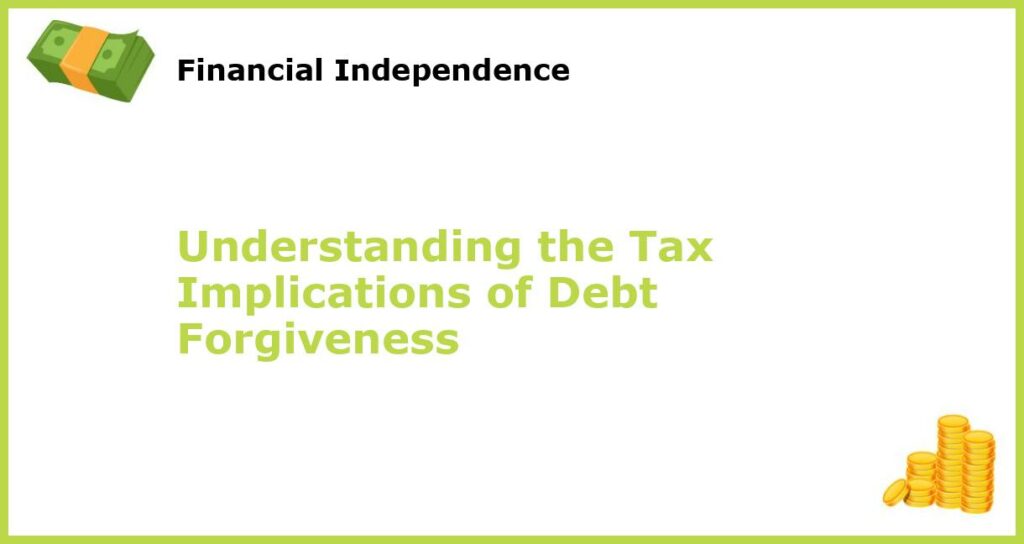Debt, arguably one of modern society’s necessary evils, can put a crimp on anyone’s finances. However, there are ways to obtain relief from the burden of debt, one of which is through debt forgiveness. But before anyone jumps on this seemingly attractive option, it’s important to understand the tax implications of debt forgiveness.
What Exactly is Debt Forgiveness?

Debt forgiveness is not a new concept. It happens when a lender cancels or forgives some or all of a borrower’s debt. The creditor may do this if the borrower is unable to make their payments or if the lender wants to eliminate the debt for other reasons. In some situations, the borrower may agree to pay a lump sum amount in exchange for the lender to forgive the remaining debt. The purpose of settling the debt with an agreed amount is to ease the borrower’s burden and provide some financial relief.
However, it’s essential to understand that this seemingly easy solution comes with tax implications that the borrower must be aware of.
When Does Debt Forgiveness Create Taxable Income?

For tax purposes, debt forgiveness may create taxable income for the borrower, except in cases when the debt is canceled under specific special circumstances, such as bankruptcy proceedings. It’s essential to understand that even though the borrower’s obligation is forgiven, it does not eliminate their tax burden.
Taxable income from debt forgiveness is not dependent on the source of debt, which can be a loan for a credit card debt, medical expense, or home mortgage.
How is Debt Forgiveness Taxed?

Ordinarily, the amount of debt forgiven is regarded as ordinary income for tax purposes, and the borrower must report it on their tax return. The borrower will receive a 1099-C form from the creditor indicating the amount of debt forgiven, which will be reported to the Internal Revenue Service (IRS). The amount of the borrower’s tax liability will depend on how much debt was forgiven and their tax bracket, and other factors.
The tax implications of debt forgiveness can be substantial, so it’s essential to involve a tax professional to understand the borrower’s tax obligations and potential ways for reducing their liability.
Can Debt Forgiveness Lead to Insolvency?

Debt forgiveness can sometimes lead to insolvency, referring to the situation where the borrower’s outstanding debts exceed the fair market value of their assets. In this situation, it might be beneficial for the borrower to apply for insolvency on their tax return, enabling them to exclude the forgiven debt from their taxable income.
However, the borrower needs to understand that insolvency does not eliminate their obligation to pay off their debt.
Are There Any Exceptions to Debt Forgiveness?
There are some exceptions, including conditions where the borrower is insolvent. The IRS considers an individual insolvent when their outstanding debts exceed the fair market value of their assets. In such cases, the borrower may exclude some or all of the canceled debt from their taxable income.
Another exception is farm indebtedness, which refers to debt incurred by farmers for farming expenses. This type of debt forgiveness is subject to some limitations.
Are There Any Limits on Debt Forgiveness?
While debt forgiveness appears as a straightforward solution to the problem of overwhelming debt, it’s critical to know that some forms of debt forgiveness may be subject to limits. The Mortgage Forgiveness Debt Relief Act, for example, caps mortgage debt forgiveness at $2 million for married couples filing jointly or $1 million for individual filers.
It’s important to note that these amounts may change depending on the agreement between the lender and borrower or the governing authority in charge of the arrangement of the debt.
What is Phantom Income?
Phantom income is an income that is taxable even though the taxpayer did not receive the actual cash or assets. Debt forgiveness can create phantom income, where the debt is canceled, but the borrower does not receive any cash or other assets from the creditor. In such cases, the borrower will have to pay taxes on the amount of the forgiven debt even though they did not receive any actual money.
It’s important to prepare for this possibility, consulting a tax professional would be one of the best ways to prepare.
How Can Taxpayers Prepare for Debt Forgiveness?
Understanding the potential tax implications is vital if a borrower intends to go through a debt forgiveness process. The borrower can prepare by getting in touch with a tax professional to understand their tax obligations and potential strategies for minimizing their tax liability. The borrower should also carefully review any debt settlement agreements or other legal contracts related to debt forgiveness.
What Else Should Taxpayers Know About Debt Forgiveness?
Debt forgiveness can be a viable solution for borrowers struggling to pay off their debt. However, taxpayers should be aware that debt forgiveness can have significant tax implications, which must be carefully considered before proceeding. By working with a qualified tax professional, they can ensure that they fully understand their tax obligations and that they can minimize their tax liability while still achieving their debt relief goals.







